Inspired in part by real events and set in the Nottinghamshire mining village where writer James Graham grew up, at the heart of Sherwood lie two shocking and unexpected killings that shatter an already fractured community and spark a massive manhunt. As suspicion and antipathy build - both between lifelong neighbours and towards the police forces who descend on the town - the tragic killings threaten to inflame historic divisions sparked during the miners' strike three decades before.
Sherwood doesn't really fit into any specific boxes - it's a state-of-the-nation piece, it's a thriller but not a procedural. It's not quite true crime but is a whodunnit and a whydunnit. Can you tell us a bit about it?
Absolutely. I think I'm impossibly relaxed about it not quite fitting neatly into any one genre. I really think that's one of the strengths of the show and what hopefully makes it compelling.
Sherwood is essentially a six-part thriller, but it’s hugely personal to me and inspired in part by real events in my hometown in Nottinghamshire. It is a contemporary drama and at its heart are two devastating killings which spark a massive manhunt and shatter a community that is already fractured after the divisive effect of the miners' strike 40 years before. As we explore that we also examine the impact of so-called Spy Cops, as there have been reports and speculation - and there is currently an investigation into the practices of undercover policing surrounding this - that they had been deployed undercover into mining communities like Nottingham.
I hope, and I say this as someone who was deeply affected by the story and the real killings that in part inspired the series, it will shock but also move and entertain, and carry an audience through every week, via the questions and all the mysteries that this story throws up. It’s also in the great tradition of northern and semi-northern playwrights and screenwriters, like and the great , who died recently, and in that, hopefully, it says something about a society and our history, and particularly the history of the red wall - which we hear so much about but know very little - and the post-industrial legacy.
Those worlds are so present in the media and conversation at the moment, with levelling up and with Brexit. To set up a story there with characters that I love, and with humour and with heart, I hope makes it something beyond your traditional crime thriller under the Βι¶ΉΤΌΕΔ.
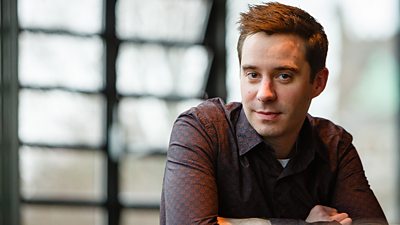
What were your motivations and inspirations for the series?
Well coming from this community, places like this rarely get screen time. I don't think there's ever been a drama set in the part of the world in which I grew up. So to be able to put those voices and those people, and their sense of humour and wit, and that experience, and the conditions that underpin that community on screen, is a huge privilege. Also, the events that in part inspired the series, a double killing that happened in my community and the impact that those awful crimes had on people who were already dealing with so much, felt like something that should not be denied, and the effects explored.
The absolute irony of all the events colliding seemed incredible. By that, I mean a lot of the tensions in these mining villages from 1984 and the miners’ strike and the subsequent presence of the police, particularly the Metropolitan Police being deployed, were still felt. Then 20 years later a double killing in a normally quiet community led that same MET force to come back into these villages, and had a huge impact on the fabric of the community.
I remember living through that and being surprised by how emotional the older generation were to see those police marched back into these streets. And the sense of them feeling trapped by their history - that it was never going to stop a legacy from haunting them and from stopping them from moving on. I felt very moved by that and I feel a real sense of responsibility to protect the people I grew up with - my neighbours and my family and my friends. This isn’t a literal adaptation, these are fictional characters, but it is inspired by the many stories that that real events evoked in the community. Sherwood is lots of different stories tied together, but absolutely, I hope, a love letter to the place where I grew up
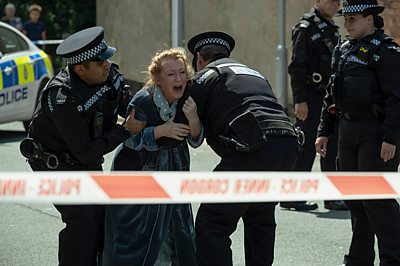
Despite the fact that the drama is inspired by those two devastating deaths within the community, everything is fictionalised. Why did you change the details of those killings and take that route into the story?
Consulting with those closest to events in my research it just felt right to fictionalise elements of their stories. Also, I think no community is defined by a single experience or a single story, and nor should it be. There are the community's economic stories to do with the closing of the mines, there are police stories involving spy cops, and there are these devastating killings, both unrelated, but at first seemingly related. There are a whole number of human experiences that I wanted to combine to get a complete picture of a place. So, I think it was the moral thing to do in terms protecting the people who I care about, and coming from that community, politically, I wanted to tell something that I felt represented it.
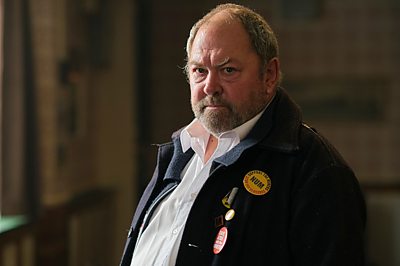
How have you worked with the real people involved in the events?
We've been in consultation with the real people throughout; the first victim's family in particular have been through this with us, and we have a really good relationship. I think they'll be the first to admit that reliving this is very hard for them, but that's why we wanted them to lead that experience. And I think they're relieved it's not directly adapted from their story and it features different characters.
I hope there's a catharsis there for them, and hopefully the wider community. I also did feel the responsibility that very soon, one day, somebody else would tell this story because it's so extraordinary and it felt like it should be me and it should be now, otherwise somebody who is less invested in these people might do it really badly and not engage with the community and not understand the beating heart of that place.
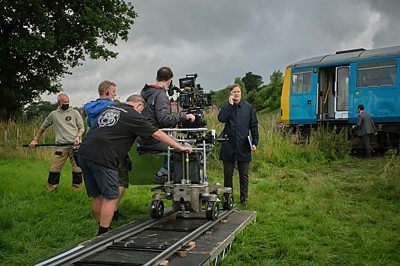
As you say, has been famously political in nature - how would you say being from Nottingham and a red wall town has shaped it?
It’s completely shaped my philosophy around trying to see all points of view, which is probably a very wet thing for a political dramatist to say. I have complete respect and admiration for political writers who have an agenda and want to communicate a particular point of view or idea, but that's never been me. I think that comes entirely from being from a world that was split down the middle and where both sides had strengths and weaknesses. I constantly feel, especially now when you have the level of extremes and polarisation in our political conversation, that it is entirely needless that we oversimplify everything and never see the grey.
Nottinghamshire is - not literally - a very grey area; to be able to empathise with strikers and non-strikers, or people on the left and people on the right - people who in 2019 voted Tory for the first time, or those who voted Labour like they and their families have always done - you have to walk in their shoes and understand them. And that's always guided my approach to writing political plays, which is probably more empathetic than sometimes the traditional political drama has been.
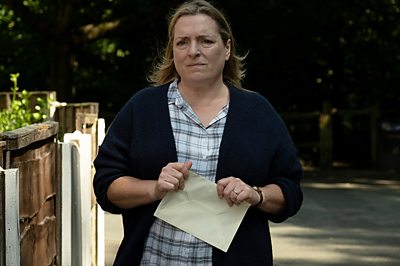
What research have you done?
We did loads of research - I'm a research-based based writer and I love that side of things. So yes, the great privilege was to be able to enter loads of different worlds, including (but not limited to) speaking to former miners and understanding their experience of the strike - that includes people who were on strike for the entire year in 1984 and people who broke away and went back to work. It was a real privilege to hear those points of view.
We spoke to the people who led the investigation into the real-life killings and obviously the families. Then there are the wider themes that come with the story, including spy cops. We were in touch with the inquiry that's going on at the moment to try to understand the purpose of that.
Also, the culture and the history; I spent many late night hours reading manuals around spy copping in the 1960s and 70s. So, it's a glorious mix of reading and meeting. But obviously, the main research I did was living in Nottinghamshire for the first 21 years of my life and just recapturing that voice, which again was a hugely fun and important thing for me do.
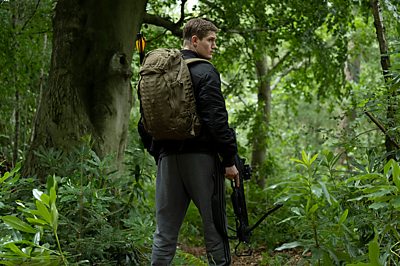
Sherwood looks at the use of spy cops, what made you want to investigate this idea?
It was in the researching of this drama. I always knew that the police were going to factor hugely into it, especially the experience of being a police officer in a mining community when you had to police your own neighbours on the picket line - that's the experience of David Morrissey’s character. So the police war was a huge factor in the story, but it was only when researching it that I started to hear these beliefs, these rumours, that the Metropolitan Police, and possibly the security services and the Βι¶ΉΤΌΕΔ Office, also planted spies in these communities in the lead up to the strike as well as during it, to monitor and to report back, and allegedly in some cases to provoke and to act as agent provocateurs.
I just found that notion really shocking. Once the inquiry began, which was whilst I was writing the scripts, the National Union Of Mineworkers became one of the contributors to that. They presented their case, and they fully believe that 40 years ago, the Thatcher government and others placed operatives into normal, everyday, working-class communities. It just was such a provocative and unknown and surprising idea, that’s not yet been proven but that I wanted to explore.
I know we're all familiar with the concept of undercover police officers from shows like Line Of Duty, where it feels very understandable to have undercover people policing criminal activities, but I think what's shocking, and what most people don't talk about enough is that in real life these were just normal people seemingly being monitored. These are families, these are me and you. That's what this inquiry is for and I think it's very important. The more I dug, the more shocked I was, and then came the absolute certainty that we should be exploring both what it would have felt like to be a spy cop, but also the lasting legacy of that and what it might be like. We’re creating the scenario of people being inserted into these communities with the sole purpose of causing divisions, and it feels dramatic and important to look at.
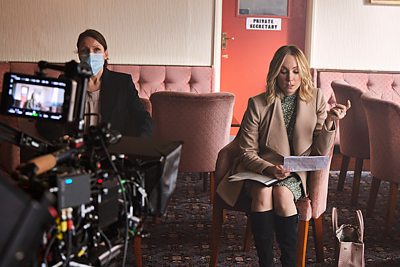
It's such an incredibly dense and delicately layered piece, but with a lot of twists and turns. How was staggering that and structuring a thriller?
I did find it a huge challenge, a really enjoyable one. Most of my TV writing so far has been for miniseries like , which has three parts, or the single Brexit film (). To do a full series and weave a traditional crime-thriller manhunt - which is essentially a cat and mouse chase - through it, alongside the delicate elements of community and the impact on people's lives and their psychology and their spirit, in a way that is accessible and popular was tricky!
I just always believed it was possible to create a really exciting, watchable, entertaining crime thriller that also addressed the sense of loss, and hopefully asks more questions about the ability to heal and reconcile. It felt like a huge opportunity and I think it's very much in the tradition of Alan Bleasdale’s or a . And you also have to trust your actors to find that heart and soul as well. I'm particularly moved by the final episode, and watching people like and and wrestle with the big history of this place, and the pain of it. I find incredibly moving and I hope everybody else does too.
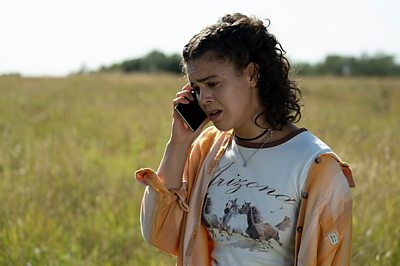
You’ve got the best of British talent in this, what was that like? Did you write for any of the cast specifically, or have them in mind when writing? What was the casting process?
I actually didn't write with them in mind, because these people feel like I know them. Obviously they’re fictionalised, but I know these types of people, these types of women and men and young people and older people and they were so vivid in my head. I actually found it quite hard to imagine actors, which I think is quite useful because I just wrote quite freely. We did worry that it might be hard to get those meaty actors, but thankfully our cast all connected with the material. We deliberately went for people that are either from these kinds of places or had a working-class sensibility, or who have traditionally done this kind of political work. We were just thrilled that they came so generously to the project, and terrified! There's a moment when you go, I can’t believe that Lesley Manville’s going to speak my words, I don't have an Oscar nomination! But also it is a collaboration - you work with them, and you adapt based on them. It was just an absolute privilege and the authenticity they bring to these words, was so important.
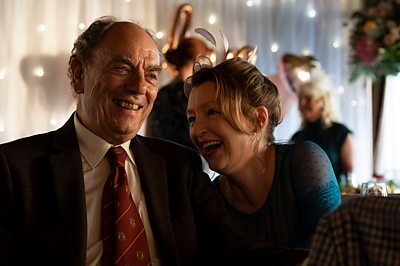
is lead director and exec producer. How did you work together? What did he bring to the series?
He’s brought so much to the series. I'm so thrilled he just recently got recognised by winning BAFTA awards for Time, which I thought was one of the most beautifully observed dramas in a long time. He brings an absolute authenticity, he's from the Midlands as well. He just understands these people and characters in these worlds and how to capture them. I wanted a kind of epic, almost beautiful sensibility where you have this landscape and you have these worlds Lewis completely understood. The team he assembled, the cinematographers and editors and musicians and art designers really understood that and brought such life and soul and beauty and scale to this story that I’m so impossibly grateful for. And then he’s also got the least amount of pretension of almost anyone ever I've ever worked with. And I know that the actors really valued that.
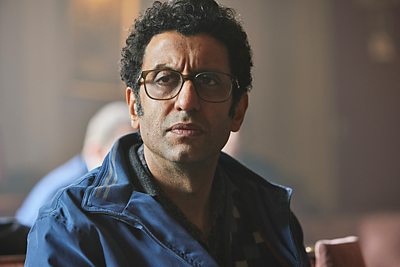
Sherwood tells the story and history of a very specific place and moment. But there are universal elements of the series that are very contemporary. What parts of the series do you think will resonate most strongly with audiences?
It is a show about how the past affects the present, and how the present inhibits or makes possible a future. So I think we're all very much talking about, and have anxieties around our national identity at the moment and how communities are divided, whether that's because of Brexit or because of cultural issues.
Here is a story very much set in the impact of the miners’ strike, which, like Brexit, asked communities to make a decision, a binary decision, much like leave/remain. Are you going to strike or are you not going to strike? And the cruel simplicity of that completely split communities and families and to this day. It's hard to believe, but to this day brothers will cross the road from brothers who made different choices, which is just devastating. I think an audience will recognise that in the political moment we're living through and the desire to ask questions about that.
I think there is an appetite to spend time in these red-wall towns, that we read a lot about in the newspaper or hear a lot about on social media, but don't get to spend time in and to listen to the voices and the characters and the stories that come from them. So given that our own Prime Minister and our own government are shining a light on these places and saying in a strange way that they are the epicentre of all dilemmas we're facing at the moment I feel like setting a big-hearted drama in these places will really appeal to an audience.
